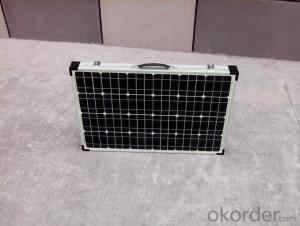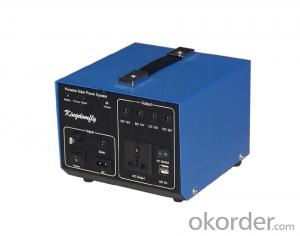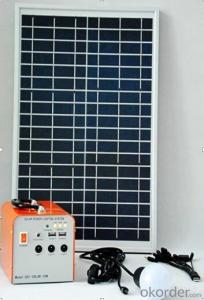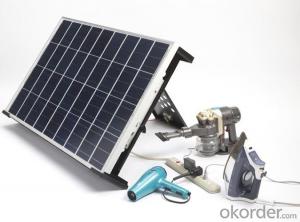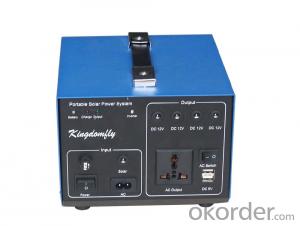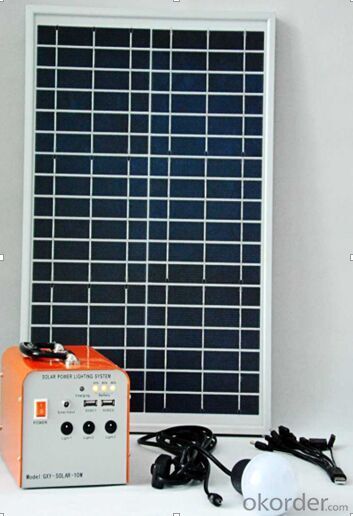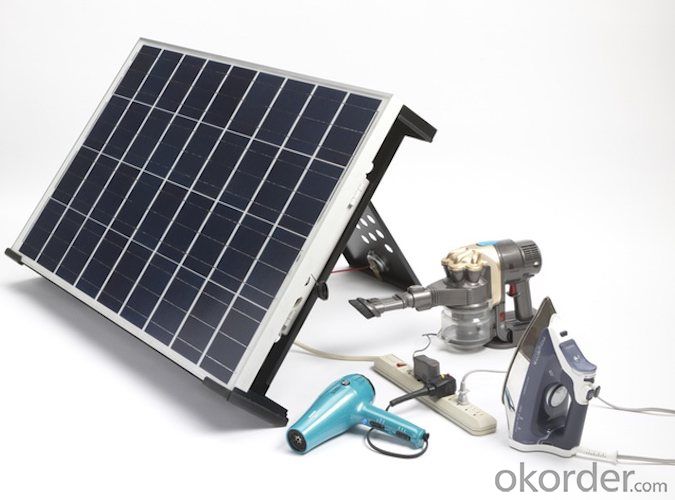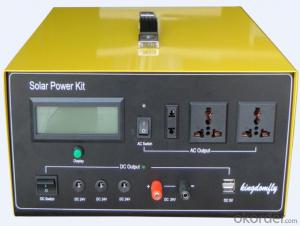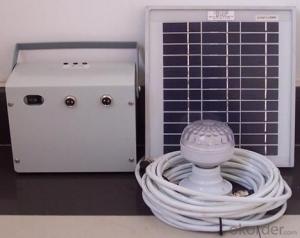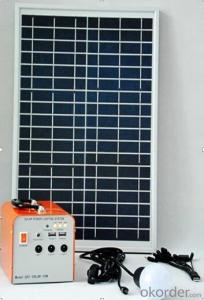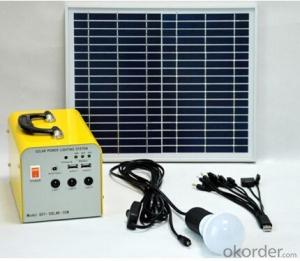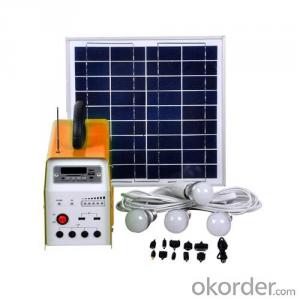Solar Energy Systems Indiana - Solar Portable System AN-S20W
- Loading Port:
- Shanghai
- Payment Terms:
- TT OR LC
- Min Order Qty:
- 0 set
- Supply Capability:
- 10000 set/month
OKorder Service Pledge
OKorder Financial Service
You Might Also Like
Specification
Description of Solar Portable System AN-S20W
Compatible portable solar power supply, also called solar mobile power, it includes: solar panel, charge controller, discharge controller, electric charge controller, inverter, outside enlarge capacity interface and battery, etc. Photovoltaic portable power supply can work in solar energy and ordinary power two modes, and can automatically switch. Photovoltaic portable power supply is used widely is the emergency relief, tourism, army, geological prospecting, archaeology, schools, hospitals, Banks, gas stations, comprehensive building, highway, substation, family camping or outdoor activities such as emergency power ideal power supply equipment.
Specifications of Solar Portable System AN-S20W
1. Solar Panel: 20W 18V
2. Battery: 12V12AH lead-acid battery
Input terminal: 1 DC input, 9V
Output terminal: 4 output terminals, including:
1x USB output, 5V 1A;
3x DC outputs, 6V 1A
Switch: one square On/Off general switch
Indication lamp: 2 pcs; Red one is for charging indication, Green one is for operating indication.
Accessories of Solar Portable System AN-S20W
1. 2pcs 3W led bulbs;
2. 1pc 3m connection wire between solar panel and cabinet;
3. 2pcs lamp holder with 3m wire;
4. 1pc AC charger
Technical Data of Solar Portable System AN-S20W
| Internal Package Size (cm) | 26*16.5*21 |
| Packing QTY | 4 |
| External Package Size (cm) | 30*47*43.5 |
IMages of Solar Portable System AN-S20W
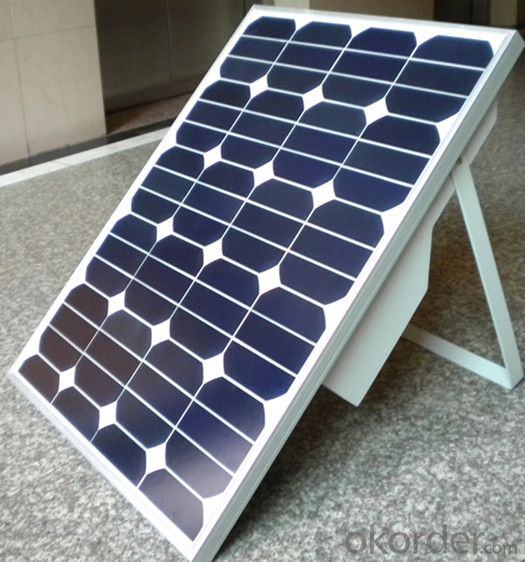
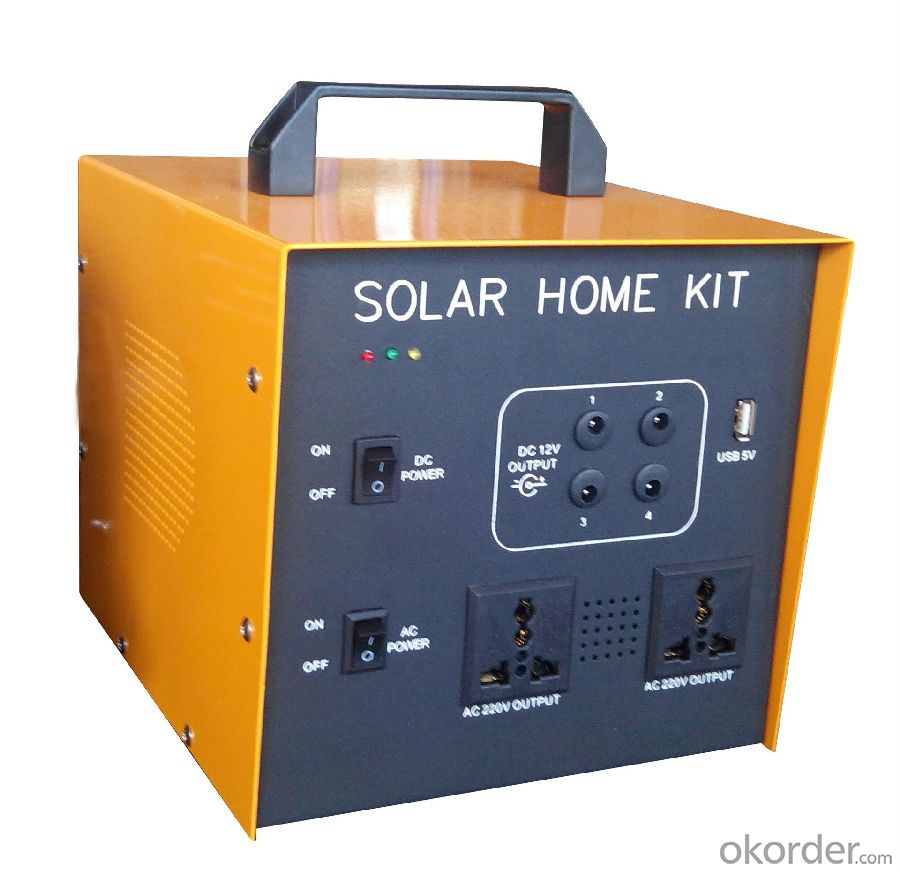
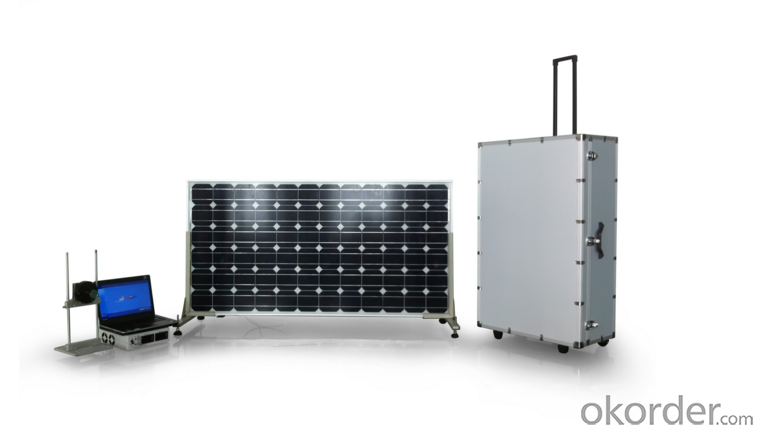
FAQ:
1. How long will my inquiry get response?
Your inquiry related to our products or prices will be replied within 24 hours.
2. Can I get professional service and suggestion?
Well-trained and experienced staffs to answer all your questions in fluent English.
3. Do you accept OEM or customized design?
OEM & ODM, any your customized lightings we can help you to design and put into product.
4. What if I need specific design?
Distributorship are offered for your unique design and some our current models.
- Q: How do solar energy systems impact electricity bills?
- Solar energy systems can have a significant impact on electricity bills by reducing or even eliminating the need to purchase electricity from the grid. By harnessing the sun's energy, these systems generate clean and renewable electricity, resulting in lower monthly electricity costs for the homeowners or businesses that have installed them. In some cases, excess energy generated by solar panels can be sold back to the grid, further offsetting electricity expenses.
- Q: How do solar energy systems affect air conditioning costs?
- Solar energy systems can significantly reduce air conditioning costs. By harnessing the power of the sun to generate electricity, solar energy systems can offset the energy consumed by air conditioning units. This means that during peak cooling seasons, when air conditioning usage is high, the solar energy system can help reduce the burden on the grid and lower electricity bills. Additionally, solar energy systems can be designed to directly power air conditioning units, eliminating the need for grid electricity altogether. Overall, solar energy systems can provide efficient and cost-effective cooling solutions while reducing the environmental impact of traditional air conditioning systems.
- Q: How do solar energy systems impact water usage?
- Solar energy systems have a positive impact on water usage as they significantly reduce the amount of water needed for electricity generation compared to traditional fossil fuel power plants. Solar power does not require any water for its operation, whereas conventional power plants consume large amounts of water for cooling purposes. This water consumption can be detrimental to local ecosystems and water resources, especially in areas with limited water availability. Moreover, solar energy systems indirectly contribute to water conservation by reducing the reliance on other water-intensive energy sources. By shifting towards solar power, we can reduce the need for coal or natural gas power plants that consume vast amounts of water for cooling and extraction processes. This reduction in water usage not only preserves local water resources but also helps mitigate water scarcity issues that many regions face. Additionally, solar energy systems can also be integrated with water management infrastructure to further optimize water usage. For instance, solar panels can be installed on reservoirs or other water bodies, providing shade and reducing evaporation rates. This helps to conserve water and maintain reservoir levels, which are crucial for agriculture, drinking water supply, and ecosystem health. In summary, solar energy systems have a positive impact on water usage. They eliminate the need for water consumption in electricity generation and reduce reliance on water-intensive energy sources. Moreover, solar power can be combined with water management infrastructure to optimize water usage and conserve water resources. By embracing solar energy, we can contribute to a more sustainable and water-efficient future.
- Q: Can solar energy systems be used in powering religious institutions like churches or temples?
- Yes, solar energy systems can definitely be used to power religious institutions like churches or temples. Solar panels can be installed on the rooftops or surrounding areas of these buildings to harness sunlight and convert it into electricity. This renewable energy source can help reduce the carbon footprint of these institutions, lower their energy costs, and serve as a sustainable and environmentally-friendly solution for their power needs.
- Q: What are the different mounting options for solar energy systems?
- Solar energy systems can be mounted in various ways, depending on the installation site's requirements and limitations. Some common mounting options include: 1. Roof-mounted systems: The most popular choice for residential installations involves installing solar panels on the roof using specialized brackets. Different types of roofs, like asphalt shingles, metal roofs, or tile roofs, can accommodate these systems. They are space-efficient and have minimal impact on the building's appearance. 2. Ground-mounted systems: These solar systems are placed on the ground with the help of metal frames or poles. Ideal for large residential or commercial installations with ample land, they offer flexibility in panel orientation and tilt angle, maximizing exposure to sunlight. 3. Carport or canopy-mounted systems: Solar panels can be installed on carports or canopies, delivering both clean energy generation and shade/protection for vehicles or outdoor spaces. These systems are commonly found in commercial or public parking lots, contributing to a site's reduced carbon footprint. 4. Pole-mounted systems: In certain cases where space is limited or ground or roof installations are not feasible, solar panels can be mounted on poles or trackers. This optimizes sunlight exposure throughout the day and is often used in specific areas. 5. Integrated or building-integrated systems: Building-integrated photovoltaics (BIPV) allow solar panels to seamlessly become part of a building's structure, replacing conventional materials like windows, façades, or roof tiles. These systems offer architectural flexibility and are commonly used in new construction or retrofit projects where aesthetics are prioritized. Each mounting option has its own advantages and considerations, such as cost, space availability, aesthetics, and adherence to local regulations. Assessing the specific needs and limitations of the site is crucial in determining the most suitable mounting option for a solar energy system.
- Q: Are there any risks of electrical fires with solar energy systems?
- Solar energy systems, although generally regarded as safe, do pose potential risks of electrical fires. The improper installation or maintenance of the system stands as one of the primary hazards. Inadequate wiring or faulty electrical connections can result in overheating and fire hazards. Moreover, insufficient grounding of solar panels or system faults can also heighten the likelihood of electrical fires. Hence, it is vital to enlist the services of qualified professionals for both installation and regular maintenance of solar energy systems, effectively minimizing these risks. To further diminish the chances of electrical fires, it is crucial to adhere to fire safety measures, including the use of appropriate wiring, the installation of proper fire detection and suppression systems, and ensuring sufficient ventilation surrounding the solar panels. Consequently, despite solar energy systems generally being safe, it is imperative to acknowledge these risks and implement necessary precautions to mitigate them.
- Q: Can a solar energy system be installed on a concrete roof?
- Certainly! Solar energy systems can indeed be installed on concrete roofs. Concrete roofs are actually considered one of the best surfaces for installing solar panels. They are usually flat, stable, and long-lasting, making them an excellent base for the panels. Moreover, concrete roofs often have plenty of space and are not hindered by nearby trees or buildings, which allows for optimal sunlight exposure. To install the panels on a concrete roof, special mounting systems are used to securely attach them and withstand their weight. All in all, concrete roofs are a superb option for installing a solar energy system.
- Q: Are there any tax benefits for installing a solar energy system?
- Installing a solar energy system comes with numerous tax benefits. One significant benefit is the federal investment tax credit (ITC), which permits individuals and businesses to deduct a percentage of their solar energy system's cost from their federal taxes. As of 2021, the ITC offers a 26% tax credit for residential and commercial systems. Moreover, some states provide their own tax incentives for solar energy installations. These incentives may encompass exemptions from property taxes, sales taxes, or state tax credits. The availability and extent of these incentives differ from state to state, necessitating thorough research into the specific incentives offered in your region. Furthermore, the installation of a solar energy system can enhance your property's value. Numerous studies have demonstrated that homes equipped with solar panels yield a higher selling price compared to those without. This boost in property value can yield long-term financial advantages. To fully comprehend and capitalize on all the tax benefits associated with installing a solar energy system, it is advisable to consult a tax professional or a solar energy expert.
- Q: Can solar energy systems be used in areas with frequent snowfall?
- Yes, solar energy systems can still be used in areas with frequent snowfall. While snow can reduce the efficiency of solar panels, it does not render them completely useless. Proper design and maintenance can help ensure that snow is quickly cleared from the panels, allowing them to continue generating electricity. Additionally, advancements in technology and the use of tilt mounting systems can also improve their performance in snowy conditions.
- Q: Do solar energy systems require a backup battery system?
- Depending on your specific needs and circumstances, it may be beneficial to have a backup battery system for your solar energy system. Solar energy systems generate electricity from the sun and can be connected to the grid, allowing excess energy to be sold back to the utility company. This means that even during times when the sun is not shining, such as at night or during cloudy weather, you can still draw electricity from the grid. However, there are several advantages to having a backup battery system. Firstly, it enables you to store excess energy generated during the day for use at night or during power outages. This ensures a reliable source of electricity even when the grid is down. Moreover, a backup battery system provides a more consistent power supply. When connected to the grid, solar energy systems typically shut down during power outages to protect utility workers. But with a backup battery system, you can continue powering your essential appliances and devices during these outages. Additionally, having a backup battery system promotes energy independence. By storing your own energy, you can reduce dependence on the grid and potentially further offset electricity bills. Ultimately, the decision to install a backup battery system for your solar energy system depends on your specific energy needs, budget, and preferences. Seeking guidance from a solar energy professional can help you determine the best solution for your situation.
Send your message to us
Solar Energy Systems Indiana - Solar Portable System AN-S20W
- Loading Port:
- Shanghai
- Payment Terms:
- TT OR LC
- Min Order Qty:
- 0 set
- Supply Capability:
- 10000 set/month
OKorder Service Pledge
OKorder Financial Service
Similar products
Hot products
Hot Searches
Related keywords
